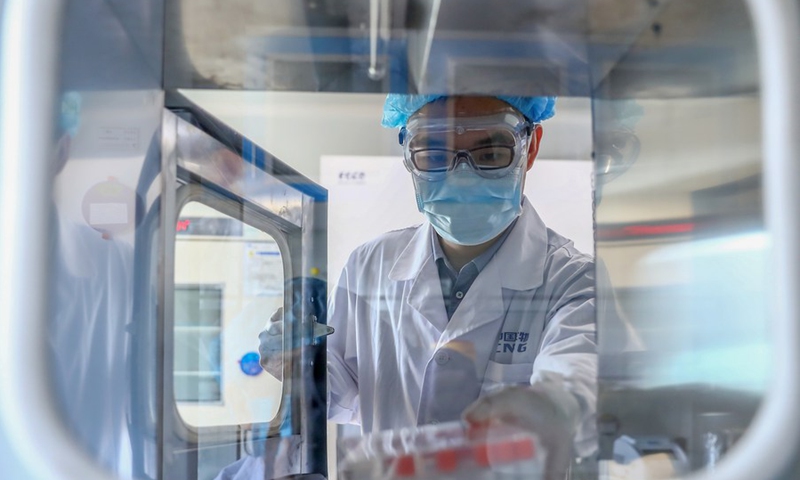Pfizer, Sinopharm vaccines show promise, virologists call for end to politicization of COVID-19 vaccine
By Zhang Han and Hu Yuwei Source: Global Times Published: 2020/11/10 20:43:41

A staff member takes out samples of the COVID-19 inactivated vaccine at a vaccine production plant of China National Pharmaceutical Group (Sinopharm) in Beijing, capital of China, April 11, 2020. Photo: Xinhua
US drug maker Pfizer said its mRNA vaccine candidate is more than 90 percent effective, while Sinopharm's inactivated vaccine showed 100 percent efficacy at one case in Mexico, both are promising results and have brought about hope of wider use in the fight against the coronavirus, experts said.
Pfizer released limited data, saying an analysis of 94 confirmed cases indicated an efficacy rate above 90 percent, Pfizer said on Monday.
Pfizer plans to apply for emergency use at the Food and Drug Administration Pfizer in late November and claimed it can manufacture doses for 15 to 20 million people by the year end, the New York Times reported.
Pfizer and German drug maker BioNTech co-developed the vaccine. Its phase III clinical trial enrolled nearly 44,000 participants.
Pfizer's announcement got world's attention and many news outlets reported it with enthusiasm, but Sinopharm's vaccine, which have been used on 56,000 people who have traveled abroad, none of whom became infected, were challenged by many Western media when the data was released.
The different reaction revealed Western media's double standard on vaccines for China and the US, with an aim to politicize the issue, Chinese experts said.
A vaccine is the key to fighting the spread of the coronavirus. The development of a vaccine is a race against time, and should follow science, a Beijing-based immunologist told the Global Times on Tuesday on condition of anonymity.
He said politicizing the vaccine would only hurt its development.
Vaccine experts noted that Pfizer's efficacy data, if accurate, is a promising rate. It can actually help prove the credibility of reported efficiency of China's Sinopharm vaccine, which was authorized for emergency use and has protected more than 56,000 people who have traveled abroad.
Sinopharm on Friday released details of a case of Huawei's Mexico branch, where 81 out of 99 staff were inoculated with the vaccine. Ten unvaccinated employees contracted the virus in an outbreak in this office.
The Mexico case alone showed a 100 percent efficacy, which has contributed to the evaluation of Sinopharm's inactivated vaccine candidate, Tao Lina, a Shanghai-based vaccine expert, told the Global Times on Tuesday.
Pfizer's 90 percent was based on phase III clinical trials while Sinopharm's is based on observation after emergency use. Although the former has greater authority academically, the latter is also a control study, Tao further explained, noting that the fact 56,000 people did not get infected could serve as a reference for the vaccine's efficacy.
Ten out of 99 getting infected is a severe outbreak, showing that Sinopharm's vaccine is very promising, he said.
China has approved three vaccines for urgent use. These have been given to high-risk groups, such as medical staff, diplomats sent to most-affected countries, and employees sent overseas under the Belt and Road Initiative.
China is also developing an mRNA vaccine, the method used by Pfizer. Industry experts noted that theoretically, mRNA vaccines can stimulate both cellular immunity and antibody immunity, and therefore have better effects than just antibodies.
Tao said that China's inactivated vaccines are suitable for extensive use to protect more people from the coronavirus while mRNA vaccines, once approved for commercial production, are easier for expanding production.
But a major challenge for mRNA vaccines is the temperature requirement for storage - minus 70C for long-term stability in comparison to 2-8 C for the majority of other types of vaccine, Tao noted, "Storage and transportation will be very expensive."
According to media reports, Pfizer's mRNA vaccine can be kept stable for five days in temperatures of 2-8 C, and its Chinese partner Fosun Pharm is building minus 70C cold storage facilities near airports and arranging cold chain to distribute the vaccine to centers in China.
Pfizer is cooperating with Fosun Pharm and the latter is in charge of bridging overseas clinical trial data with domestic data to get the vaccine approved in China.
While all vaccines are racing against the clock to protect human lives from the virus, different technology routes will be tested in the fight against coronavirus, and mRNA, a newer method used for developing vaccines, might be the future direction for the industry, Tao said.
According to the Johns Hopkins University, global COVID-19 infections have reached 50, 913, 451 with 1,263,089 deaths as of 8 pm Tuesday.
Posted in: SOCIETY